Crafting a strong marketing campaign is essential to position your brand for digital success. There is no mythical “best” strategy, it all depends on the site, product, and goals. Two of the most prevalent marketing strategies are search engine optimization (SEO) and pay-per-click (PPC) campaigns. Digital marketers are often confused over the age-old SEO vs PPC debate. The question on each mind is, “How is ranking different when comparing PPC vs SEO?”
According to experts, both options can be highly effective, if used properly. If one can comprehend the differences between SEO and PPC, he can take his brand to a whole new level through careful use of both.
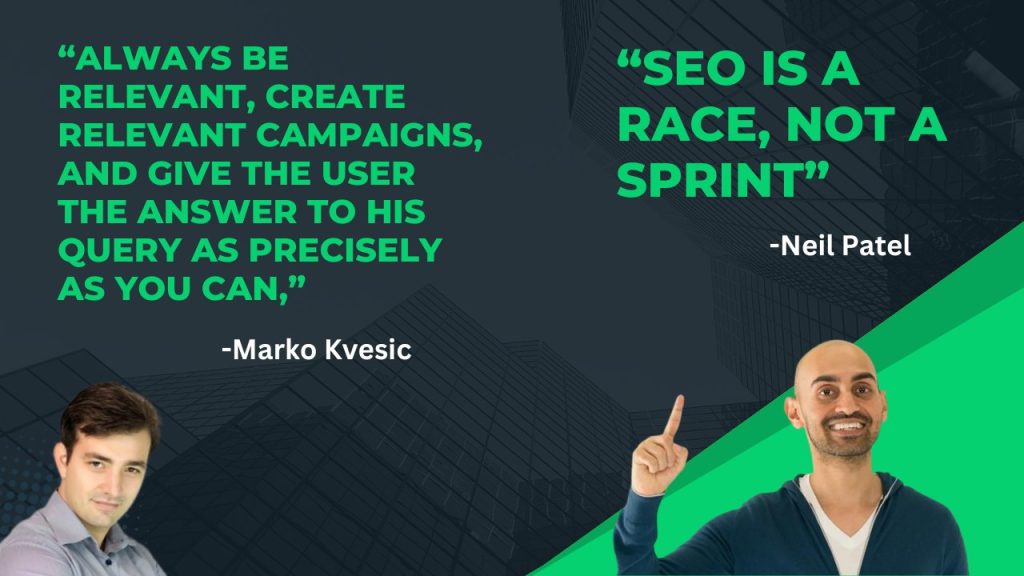
Understanding the nuances of SEO and PPC, and how ranking is different when comparing PPC vs SEO is vital to leveraging the right strategy for your business. Here, we tell you everything you need to know about the difference between organic SEO vs PPC paid traffic.
Benefits of an SEO-Focused Marketing Strategy
SEO involves refining your website’s content and structure to enhance its visibility in organic search engine results. It aims to ensure that when users type a query into a search engine like Google, your website stands out prominently in the search results. And of course, it’s necessary to rank high in search results in your niche to increase your brand visibility.
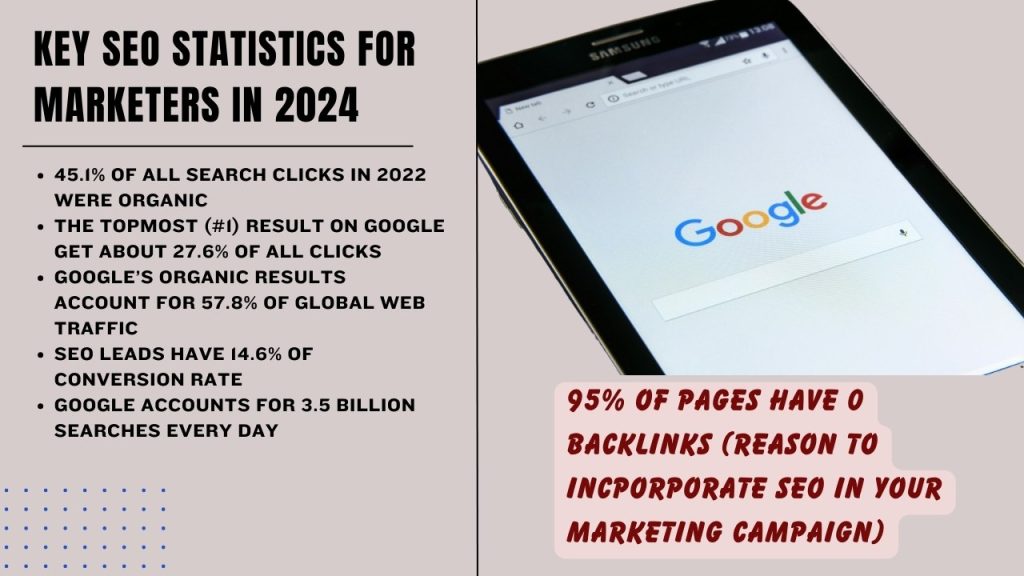
Let’s help you understand the influx of organic traffic your website can enjoy with a couple of facts. In total, 68.7% of users stop at the first three search results, and sites with the snippet receive 43% of visits. All other sites receive much lower views in percentage terms. However, the position in the ranking is influenced by many factors. You can check it out and download VPN for your PC. Try changing your Windows VPN server and entering a request. You may notice that your website has either changed its ranking or disappeared from the rankings altogether. Not many websites maintain global visibility, although they strive to do so.
The Long-Term Impact
One significant advantage of SEO is its long-term impact. Although the initial investment in organic SEO might take some time to yield substantial results, the traffic generated is typically sustainable over an extended period. By maintaining high-quality content and a well-structured website, you can enjoy lasting benefits for years.
In other words, if you manage to build a powerful SEO strategy and rise to the TOP 3 of search results, you can count on 20-40% of visitors from people, who type in the right query. There will be many more related queries to help your site rank higher. This effect will last for 2-12 months. If you keep the information up-to-date, you can count on a longer period.
Guaranteed results over time
SEO requires some monetary investment for a longer duration than PPC or other paid advertisements. However, this investment of money, time, and effort assures you higher visibility in the long run. In short, SEO is not a quick fix, but it is a profitable long-term investment – a strategy for the future. If you are struggling for stability in a competitive niche, the longer it will take and involve more investment. It means that progress can take more than one month, and sometimes even a year, depending on the type of business, industry, and market conditions. As a strategic SEO campaign will involve real-time data, practical analyses, a comprehensive approach, and consistent tracking, it will guarantee you the desired results eventually. Hence, the wait will be worth it.
Building Trust with the Audience
Your audience isn’t a monolith; they’re at various stages within the sales funnel. Some are in the awareness phase at the top, just getting to know your brand. Others are at the decision phase at the bottom, ready to make a purchase.
SEO allows you to craft diverse content types (like blog posts, guides, and case studies) that cater specifically to each segment of your audience, no matter where they are in the funnel. This targeted approach increases the likelihood of guiding visitors through the next steps in the funnel as they engage with your content.
Developing Brand Authority
Appearing frequently in search results for queries relevant to your products or services establishes trust and enhances your brand’s authority among your target audience. All marketers debating on SEO vs PPC and in favor of organic SEO stress this fact mostly. With SEO, your brand appears organically in the search results. Subconsciously, a person remembers brand names and gradually collects information about you. When he frequently sees your product, answers questions, and links from other publications, the authority of the website increases in the eyes of both customers and search engines. Such natural development is always beneficial for the site and brand.
Significance of PPC Advertising
There’s no reason to think that PPC is useless in front of SEO. Although it’s a paid marketing campaign, being at the top of Google display results is indeed something!
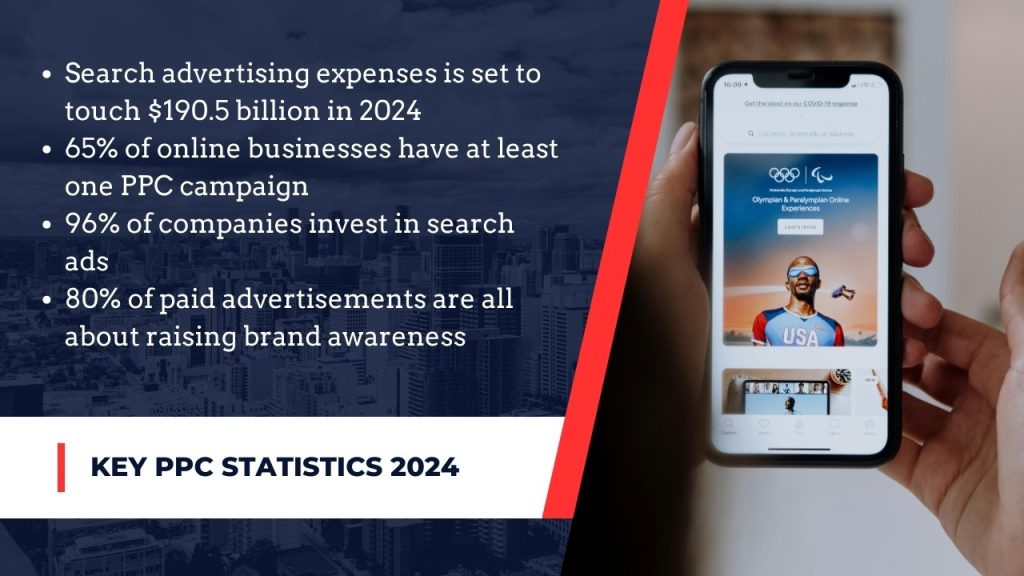
Paid advertising helps improve your brand exposure, enabling it to reach a wider audience. However, that is not all. Pay-per-click or PPC advertising offers many more benefits to small business owners and new brands. Let’s explain:
Faster results with minimum investment
You need not break your banks to run an ad on Google or other search engines. Moreover, Pay-per-Click advertising produces faster results that organic SEO. It is justified, considering once you stop running the ad, the results will disappear. But your brand will get the exposure it needs to build a stronger campaign later.
Targetting a Specific Audience
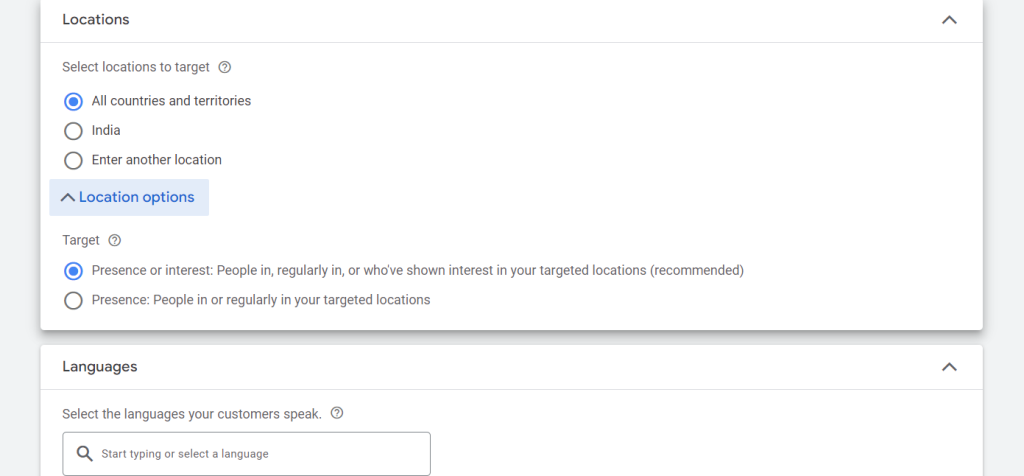
Google Ads allows you to target a specific audience for your advertisement. You can select your audience based on location, demographics, user behavior, and interests. You can also retarget people, who have visited your website but not taken any action through display ads. PPC advertising can thus help you change their minds and come back to your website.
Track, Measure, and Alter Results
Google Ads is an incredible tool that not only helps you run ads on the search engine but also track their progress, measure the results, and even alter the ad, depending on the analyses. You can make changes to your PPC campaign if things do not go according to your expectations. You can tweak underperforming ads to make them more effective. And after you make those changes, the results will show faster.
Drive Immediate Traffic to Any Website
If an SEO campaign is taking time (which is natural) to give your website a deserving rank on Google, you can use paid ads to complement the efforts. Paid advertising helps drive immediate traffic to any website, irrespective of its current ranking. Hence, many brands use both strategies simultaneously. It helps maintain a consistent traffic influx, while their marketing team works to strengthen their online presence through organic SEO.
SEO vs PPC Advertising – Which is Better?
Pay-per-click ads are typically displayed alongside organic search results. Companies often utilize these ads for specific marketing initiatives with defined start and end dates. Some, like HelloFresh, bid on their brand names as part of a broader marketing strategy. This approach is mainly associated with search engines, where advertisers compete for keywords that align with their target audiences. Also, PPC is used by new brands to increase their brand exposure and visibility. As it doesn’t require search engine algorithms to reach the audience, brands get recognition faster through repeated appearances.
But organic search is different and VAST! Once you reach a position in the SERPs, you can maintain it through content updating, and fulfilling user intent for years at a stretch. However, in today’s AI-dominated digital landscape, it’s a tad difficult to maintain one’s position in the search engine results. You should put in some extra effort to cement your status as a high-ranking website on Google or other search engines. Paid advertising can help you with that.
If you think carefully, both are important as a well-crafted marketing strategy to create a robust presence online.
Immediate Results (PPC) + Organic Dominance (SEO)
While paid advertising can give you immediate results, organic SEO can help maintain your brand recognition through valuable content that fulfills the user intent perfectly. In other words, PPC can be that “Quick Fix” for your brand, which is not too well-known. The ads displayed on the top of SERPs (Search Engine Results Pages) can drive more traffic to your website, thus giving you more leads to increase your business’s bottom line. Meanwhile, organic SEO strategies can help strengthen your position in the SERPs through content updation, organic promotion, social media marketing, etc.
Organic SEO Reduces PPC Expenditure
A paid advertising campaign functions on a pay-per-click basis. You incur charges exclusively when a user clicks on your advertisement, which can be a budget-friendly choice if executed properly. However, with more clicks, your budget will invariably increase. You can then stop running the campaign to reduce the expenses. However, if your website does not have a strong organic presence, it will be pushed down by your competitors, thus disappearing ultimately from your audience’s memories.
Organic SEO can prevent that from happening, besides reducing your PPC costs. If your website is properly optimized, it will still be at the top of SERPs, even when you stop running the paid ads.
PPC pushes; SEO keeps
For any new business, brand recognition is crucial. With PPC, you can easily improve your brand exposure within a short span, once you decide to stop running ads, you can rely on organic SEO to keep your brand at the topmost positions. Hence, we can say that paid advertising pushes your brand in the search results, while SEO helps keep it there.
Both are equally important for any brand.
How to Determine the Best Marketing Strategy for a Website?
The discussion surrounding SEO versus PPC advertising isn’t about choosing one over the other; it’s about finding a harmonious balance that aligns with your specific goals and resources.
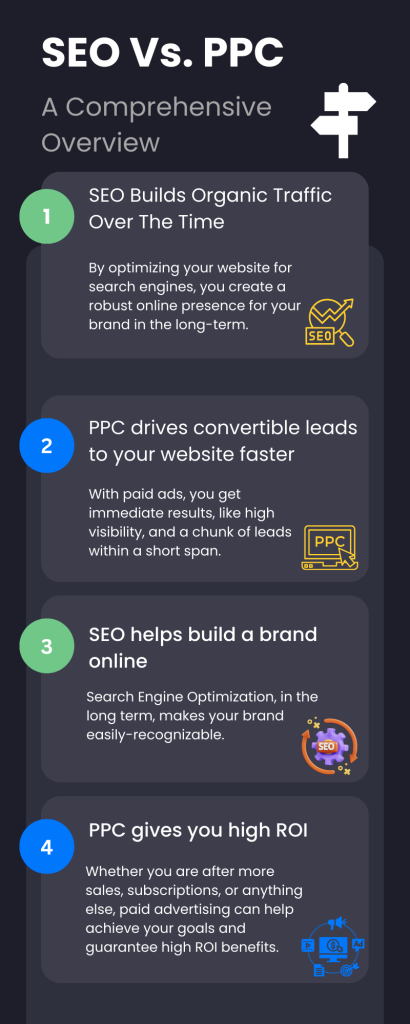
You can always connect with an experienced digital marketing professional to get a deeper insight into the nuances of both SEO and PPC. However, the following hacks can help you make a better-informed decision.
Define Your Goals
Begin by clearly outlining your marketing objectives. Do you require immediate results, or are you willing to invest in a long-term strategy? Or, do you need both? Analyze your objectives carefully before making a decision. It is because your decision will determine how your brand will perform both in the short and long terms.
Assess Your Budget
Carefully evaluate your budget constraints. While paid advertising can deliver swift outcomes, it can also quickly deplete your resources, if not managed wisely. On the other hand, SEO may demand a larger initial investment but can be more cost-effective over the long term.
Monitor and Adapt
No matter your choice, ongoing monitoring and adaptation are essential. Both SEO and paid advertising require continuous performance analysis and adjustments. If your current strategy isn’t working, you need to understand the reason for its underperformance. Both SEO and PPC tools allow you to track the progress of your markerting campaigns. Leverage the same to stay updated with the results of your efforts and make changes whenever there’s a roadblock.
Over to You
If you ask us, there’s no SEO vs. PPC but SEO and PPC!
Combining both in your marketing strategy can take your brand visibility through the roof. Organic SEO can give your website a strong push to maintain its position in the SERPs. On the other hand, paid advertising can help it gain expected results in a shorter span. You can promote the launch of a new product/service, retarget visitors, or promote a profitable landing page on your website through paid advertising. If the CPC (Costs-per-Click) exceeds your budget, you can always stop running the ad and rely on organic SEO to take the reigns.
Blending SEO and paid advertising can thus help your business make the most of the digital landscape and reach the target audience, fulfilling their requirements and expectations.
FAQs on PPC vs SEO
Is SEO or PPC Better for My Business?
When planning your digital marketing strategy, it’s essential to understand the distinctions between Search Engine Optimization SEO and PPC advertising.
SEO is inherently a long-term strategy. It may take some time for your content to climb the search engine results pages (SERPs). However, once optimized, your content can secure top rankings and maintain its position over time. Moreover, ranking organically often enhances your website’s credibility, as it doesn’t carry the “Ad” label next to the link. Although SEO demands patience and effort, it can result in substantial, sustainable traffic growth.
Conversely, PPC ads offer immediate visibility. If you’re ready to invest, your ad can appear at the top of search results almost instantaneously. Yet, this approach may not be feasible for small businesses with constrained marketing budgets, as ongoing costs can add up.
Is It Possible to Combine SEO and PPC?
You can leverage the power of both SEO and PPC simultaneously to harness their respective strengths, thereby creating highly effective marketing campaigns. To quickly elevate your brand’s visibility, initiate a PPC campaign. This strategy will promptly place your brand in front of a broad audience.
Subsequently, as your online presence grows, enhance your organic traffic through an SEO campaign. With increased organic visibility, you can gradually decrease your PPC expenditure while sustaining traffic levels with a robust SEO strategy.
What are the benefits of using a combined marketing strategy?
– Enhanced Keyword and Conversion Insights: Utilize keyword and conversion data from PPC campaigns to inform and optimize your organic search strategies.
– Geographic Coverage: Address regions where SEO performance is lacking by deploying targeted PPC ads.
– Increased Traffic Volume: Boost overall site traffic by strategically targeting high-performing keywords through both paid and organic channels.
– Cost Management: Shift high-cost, high-volume, or low-converting keywords from PPC to organic search to optimize budget allocation.
– Optimized Content and Landing Pages: Apply insights from A/B testing of PPC ad copy and landing pages to improve your organic listings and landing pages.
– Remarketing Opportunities: Retarget visitors who initially found you through organic search with custom PPC messaging based on their engagement with your site.
– Keyword Strategy Validation: Test and refine your keyword strategy using PPC before committing to a long-term SEO plan.
How to run a paid advertising campaign?
If you want to run a PPC campaign on Google, go to Google Ads and create the campaign by filling in the required details. The tools has an amazing and user-friendly interface that is easy to understand and operate. You can also research keywords, select your audience and run a campaign that is on-point, comprehensive and data-driven, to say the least.
My brand is new. Will I get clicks on my paid ad?
If your ads appear on search, you are likely to get more than 45% page clicks. And the users, who click on paid ads are twice as likely to convert than organic visitors. It doesn’t matter if your website is new. You will always benefit from paid ads.
How do PPC costs get determined?
Paid advertisement costs are based on three main factors:
> Bidding – It is the amount of money you are ready to spend on your campaign. Once you set the bid, you won’t spend more than the specified amount. However, you can end up paying less, depending on the performance of your ads.
> Quality of ads – Ad quality is also a determining price on search engines like Google. If you manage to craft a high-quality ad maintaining all the essential features, you may pay less for the number of clicks.
> Competition – If you are bidding for a highly competitive keyword, chances are, the cost per click (CPC) will be higher.
What kind of businesses benefit from paid advertisements?
Any business can earn good ROI benefits from paid ads. However, businesses that are more likely to get immediate results are eCommerce stores, manufacturers, restaurants, diners, franchises of eminent brands, health-related businesses (doctors and dentists), equipment dealers, electronic manufacturers/sellers, etc.
What if I choose only organic SEO for my brand and not PPC?
If you only choose to optimize your website for search engines, it will take you some time before you reach your target audience and get real-time ROI benefits. On the other hand, paid advertising can give you immediate leads and help increase your conversion rate.
Will my PPC campaign affect my organic search results?
Not directly! But it will add some value to your organic marketing campaign. By increasing brand visibility in search results, it will help your target audience get to know your brand. Moreover, using shareable content in your paid ads can help improve backlinking and social sharing potential, thus adding more value to organic SEO.